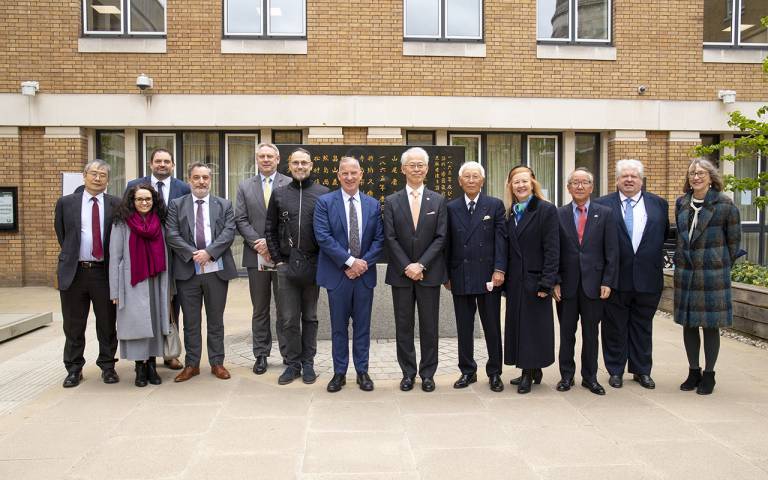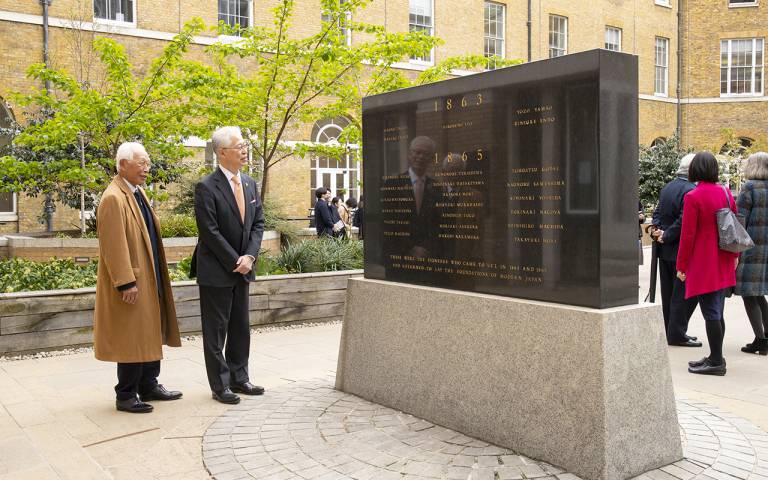‘Hope during turbulent times’: UCL’s pioneering work with Japan
8 April 2022
This week, UCL welcomed His Excellency Hajime Hayashi, Ambassador of Japan, for the first time for a special event celebrating the university’s varied and impactful work with the country.

UCL’s President & Provost, Dr Michael Spence, introduced Ambassador Hayashi, who spoke of UCL and Japan’s “long and outstanding history” and how the two continue working together to enable recovery from natural disasters.
The event in UCL’s Japanese Garden, which took place just a few weeks after an earthquake hit north-east Japan, saw Dutch artist Bouke de Vries introduce his new public artwork, Fragments of Memory. He explained how he was inspired by both the pioneering work of UCL’s cross-disciplinary natural hazards research unit, EPICentre, as well as the history of the famous ‘Chōshū Five'.
EPICentre provides a forum for multidisciplinary research into risk from natural hazards and disaster risk reduction, aiming to drastically reduce loss of life, livelihoods and economic loss in natural disasters.
The Chōshū Five were the first Japanese students to study abroad, coming to UCL nearly 160 years ago. Upon returning to Japan, the young men – including Hirobumi Ito, Japan’s first Prime Minister - had a radical, transformative effect on the country’s constitution, government, infrastructure and education system.

Ambassador Hayashi said: “I am aware that the Fragments of Memory monument was created to blend images of the turbulent times in which the Chōshū Five lived with those of modern Japan, and the difficulties caused by disasters in Japan. As a matter of fact, Japan has often been hit by natural disasters, including the Great East Japan Earthquake and Tsunami on 11 March, 2011.
"Against such a backdrop, recovery from disasters is certainly one of Japan’s major challenges, and we hope that the knowledge and expertise created at UCL will provide clues for overcoming these challenges."
The event celebrated the 12 cherry trees donated to UCL through the Sakura Cherry Tree Project, which was launched by the Japanese private sector in 2019. More than 7,000 cherry trees have been planted in public spaces all over the UK thanks to the project committee members.
Ambassador Hayashi said he hoped the UCL trees would "provide an opportunity for reflection for professors, faculty members and students" and evoke the "deep friendship" that Japan and the UK have shared for such a long time.
Bouke, a London-based Dutch artist specializing in ceramic art and porcelain, explained how his sculpture drawn from an original fractured 17th century Arita soy bottle celebrates the beauty of healing and the power of resilience, adding: “I can’t begin to tell you how important this opportunity has been to my practice. Damage can be beautiful and can lead to something that gives you hope.”
His two-metre high bronze sculpture forms part of UCL's pioneering Public Art programme, which allows artists to freely explore their practice in collaboration with the university’s world-class academics.
Today, UCL enjoys a range of innovative collaborations with leading Japanese institutions, including:
- Institutional-level partnerships with Tohoku University (on disaster science, data science, neuroscience, materials science, EDI and higher education) and Osaka University (on global health and wellbeing, urban sustainable design and society and education).
- Work with Japanese manufacturer HORIBA, a longstanding supporter of Chemical Engineering and advanced propulsion research at UCL.
- UCL Statistical Science and the Alan Turing Institute working with Tokai University and the University of Shizuoka on a new method for detecting tsunamis using existing GPS satellites orbiting Earth, which could serve as an effective warning system for countries worldwide.
- World-leading ophthalmic pharmaceutical company Santen working with UCL’s Institute of Ophthalmology to open its first research laboratory in Europe, supporting investigation into how to prevent and reverse damage caused to the optic nerve and retina by glaucoma.
- UCL’s Faculty of Brain Sciences work with Japanese pharmaceutical company Eisai to identify and validate novel drug targets across key processes in neurodegeneration. In March 2021, UCL and Eisai announced that the first drug candidate from their research collaboration, has been selected by the Dominantly Inherited Alzheimer Network Trials Unit (DIAN-TU), as the first investigational medicine among anti-tau drugs for their DIAN_TU tau study.
Other guests at the event included representatives from the Sakura Cherry Tree Project; HORIBA; the Japan Society for the Promotion of Science, and students from the UCL Japan Society.
UCL now has more than 200 students from Japan, and student exchange agreements with Tokyo, Osaka, Kyoto, Doshisha, Hitotsubashi and Waseda universities.
The university has more than 1,900 active alumni in Japan, and the UCL Japan Club alumni group that was established in 1992.
Links
- 'Fragments of Memory' by Bouke de Vries opens at UCL
- UCL researchers recognised with new Royal Academy of Engineering industry–academia partnerships
- UCL EPICentre
- UCL Engineering
- UCL Public Art
- Embassy of Japan in the UK
- Sakura Cherry Tree Project
Images
Top: (Centre) Bouke de Vries, Dr Michael Spence and His Excellency Hajime Hayashi with other guests at the celebration event
Centre: His Excellency Hajime Hayashi and Mr Keisaku Sano (Sakura Cherry Tree Project) at UCL's Japan Monument
Image credit: UCL Global Engagement / Mary Hinkley
 Close
Close

